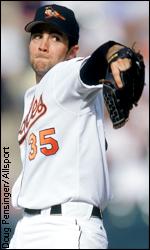With the Yankees' powerful, almost relentless courtship of Mike Mussina
now complete -- a triumph that will pay the pitcher $88.5 million over six years -- it's clear the Bombers have chosen pitching as the weapon of choice for the
new millennium.
Indeed, there's no mistaking this ballot: Roger Clemens' 98-mph heat,
Orlando Hernandez' leg-kick-to-the-heavens windup and now, Mussina's
knuckle-curveball.
Question is: are the Yankees jeopardizing their dynasty by continuing to
let the offense decline?
|  | | Mike Mussina is the first big free agent the Yankees have signed from another team since bringing in David Wells from Baltimore in 1997. |
Club officials admit that Mussina's signing will end any further
reconstruction efforts for the 2001 team, and that the offense that
sputtered for most of last summer will be asked to fuel the engines one more
time.
But it won't be easy, since the Yankee production numbers have been
shrinking for three straight seasons. Since 1998, the Bombers' slugging
percentage has shrunk from .460 to .453 to .450, and their run differential has
decreased from 965-656 to 900-731 to 871-814.
Suddenly, it becomes important whether 38-year-old Paul O'Neill still has
his bat speed. Suddenly, it matters that David Justice -- who hit 41 homers
with 118 RBI -- turns 35 in April and might never duplicate those numbers again.
Scott Brosius has dropped 70 points from 1998, when he was the World
Series MVP. Only 33, Brosius nevertheless looks so old and worn out, the
Yankees are said to be interested in Cuban defector Andy Morales to play
third.
Jose Canseco, who found 11th-hour life in his bat after being liberated
from the Devil Rays, is no longer a Yankee, and Glenallen Hill, who hit 10
home runs in August alone, will spend most of his time on the bench.
More? Tino Martinez's average has dropped three straight years, all the
way to a run-of-the mill .258, while he dipped below 20 home runs and 100 RBI for
the first time in his five years in the Bronx.
So, it's not unreasonable to ask the pitching-rich Yankees: who'll drive
in the runs? It's true Derek Jeter is still improving, even though his home
run and RBI totals dropped off noticeably from 1999. And if Bernie Williams
doesn't have Manny Ramirez-like ability to drive in runs, his 30 homers and 121
RBI in 2000 were both career-bests. And Williams did bat .368 in situations
described as "close and late" -- not to mention an extraordinary .692
(9-for-13) with the bases loaded.
Still, the Yankees can't survive much longer on this patchwork offense.
A club official conceded, "we're trying to get one more year" out of this
nucleus before an overhaul to the batting order. Obviously, George
Steinbrenner thought it was wiser to pluck Mussina away from the Orioles than
negotiate with Ramirez.
That may or may not have something to do with the Boss' personal dislike
for O's owner Peter Angelos. There are few greater pleasures in
Steinbrenner's life than besting Angelos, whom he has never forgiven for
having a nicer ballpark and a higher average attendance totals than the
Yankees.
|
A formidable four
|
|
The top four starters in the Yankees' rotation for the 2001 season and their statistics since 1995:
|
|
Pitcher
|
W-L
|
ERA
|
|
Clemens
|
88-49
|
3.34
|
|
Mussina
|
95-60
|
3.70
|
|
Pettitte
|
100-55
|
3.99
|
|
Hernandez*
|
41-26
|
4.00
|
|
* First year in the majors came in 1998
|
Steinbrenner loves beating the Mets, but stealing Angelos' best pitcher
gives the Boss a unique, personal thrill. And make no mistake, losing Mussina
means the Orioles have no shot of closing the gap on the Yankees -- if they
ever did. But now they're beyond hope, struggling for ways to keep Albert
Belle focused and Cal Ripken healthy.
Obviously, the O's downward spiral and lack of stability weighed heavily
on Mussina. There have been three managers in five years at Camden Yards, not
to mention eight pitching coaches in eight years. So who could blame him for
running straight into Steinbrenner's loving embrace?
But Mussina still hasn't faced the reality of being merely a No. 4
pitcher in the Bronx, instead of a staff ace. Nor will Mussina enjoy the
comfort of Camden Yards, where he posted a 2.90 ERA last season, the second-best home ERA
in the American League after Pedro Martinez' 1.84. On the road, Mussina's
ERA soared to 4.93.
And while we're asking, did it trouble the Yankees that Mussina slipped
under .500 last year for the first time since 1991? Granted, he had the worst run support in the league. But does it worry anyone in the Bombers' hierarchy that Mussina will be approaching his 38th birthday
at the end of this contract?
Probably not. If there's any ironclad equation in baseball, it's that the
Yankees live for today, and that no one who'll toast Mussina's arrival on Thursday will be around in 2006. That includes Joe Torre and GM Brian Cashman. Maybe even Mussina will be history, too,
especially once baseball's economy roars past a $14 million a year salary for
a pitcher.
What is certain is that the Yankees have a fine rotation for 2001, and
they can now afford to give David Cone a chance to win the No. 5 job --
cheaply, at no more than $500,000 guaranteed. Mussina is durable, he's won
many more games than he's lost, and has terrific stuff. In short, he's a
clear upgrade over Denny Neagle.
But what Mussina can't do is answer the question that promises to smother
the Yankees, starting now: who'll drive in the runs?
Bob Klapisch of the Bergen (N.J.) Record covers baseball for ESPN.com. | |
ALSO SEE
Mussina, Yankees agree on six-year, $88.5M deal
|


